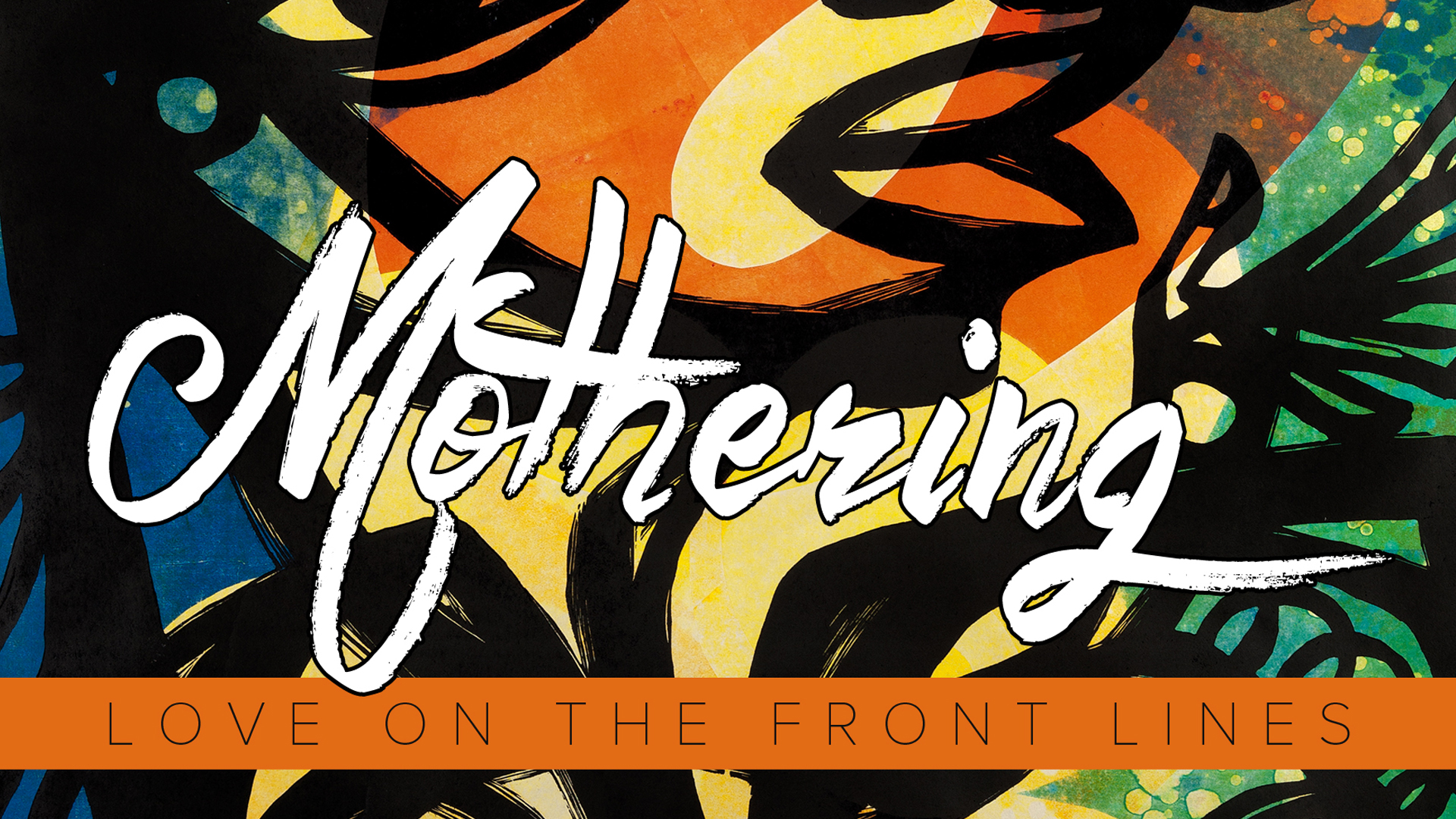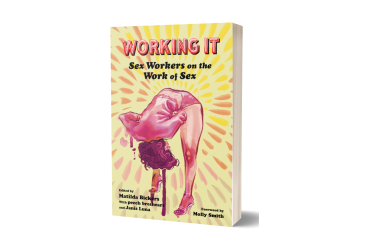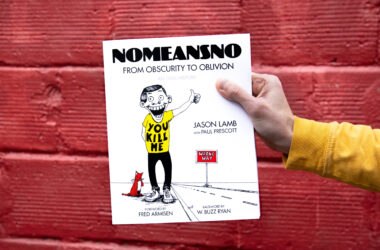by Marcia Ratliff
Winona Daily News
April 3rd, 2016
Mai’a Williams’s life could be described many ways, but boring is not one of them.
The thirty-something is a journalist, poet, human rights worker, artist, midwife, and mom. She’s lived in Palestine, southern Mexico, Egypt, Ecuador, and Germany. Her home base for the past year has been Winona, though she admitted the town is a little quiet for her taste.
Currently, Williams is on a book tour for the recently published anthology “Revolutionary Mothering,” and she’ll read in Winona April 5 before continuing on to Minneapolis, Chicago, and Los Angeles in the coming months.
The book is about motherhood on the margins of society, which is a common theme for her, Williams said in an interview on a recent weekday.
“Most of the work that I do is centered around these themes of being a mother, and political revolutions — which I realize is a strange juxtaposition to have — and the third world, because that’s where I’ve lived for the past few years, and women of color. I just really like color in general,” she said.
She spoke with the Daily News from a café in Ecuador, where she was on retreat in anticipation of the book tour. The interview has been edited for length and clarity.
How did a self-described nomad like yourself end up in Winona?
I have asked myself that question (laughs). My daughter Theresa’s father and grandparents live in Winona. Long story short, she’s eight years old and I promised her one year of normal American life, Norman Rockwell stuff. She’s never been to a U.S. school, she’s never lived in the states for that long.
Tell me about the book “Revolutionary Mothering.”
Well, I worked on this anthology with two other editors for seven years. It has 40 contributing writers from all across the United States, and it arose out of a zine and blog called Revolutionary Motherhood.
It basically looks at mothering on the margins, so looking at mothering and poverty, mothering and race, mothering and sexuality, and building communities of mothering.
Its main precept is this: When you don’t fit into the mainstream hegemonic view of what mothering looks like, your access to basic resources, your access to being able to create community, becomes much lessened.
And so one of our jobs was to use this book as a way to begin conversations about creating communities that are supportive, that are more focused on caretaking, and that are placing mothers on the margins at the center.
How do you define revolutionary mothering?
It’s definitely not the mother, father, two kids, and a dog and have a minivan kind of thing. What I’m more talking about is what I’ve called radical caretaking. It’s not just biological—it’s taking care of people, especially old people. It’s all the different ways that we take care of each other, where the compensation for it isn’t something you can put on your tax form. And it’s work that has been unpaid and undervalued.
Girls and women are the ones that have been forced to learn these skills culturally, but they’re really good skills to have. I would really prefer that everyone from a young age learned these skills, and we would all be better human beings.
What is the main push of the book? Healing? Organizing? Empowering?
I think it’s a community building—that’s where I would place it. It was always about the fact that as a marginalized mother, you don’t really have a community. So your community starts to happen through letters, zines, online, blogs.
It grows because it has to and that’s what you need. So this is sort of part of a conversation about how we create those communities, and how we nurture them, and seed them, and grow them.
I have a really strong belief that doing so is a form of activism and is a way of creating the kind of structures that we need to be able to survive the violence that exists in the world, whether that be capitalism, or sexism, or racism.
What are some of the qualities you’ve seen in those communities, in your experience and in the process of editing the book?
One of the things I like to say is, we are not the ones destroying the earth. Starting in the 1980s or so was this idea of the welfare mother or the poor mothers or immigrant mothers and their children somehow being the ones who were responsible for all of the turmoil. The reason you don’t have jobs is because of immigrants, and the reason that you can’t do x, y and z with your life is because of people giving money to these welfare mothers.
Not only is that inaccurate, but the reality is quite the flip. Your 1 percent of your taxes that go to welfare don’t ruin your economic state. We didn’t cause the 2008 Wall Street crash. We aren’t the reason the environment is being destroyed. We are none of this.
We are actually the ones who are on the front lines, we’re the ones who are getting hurt the most by those things. We are the ones who are most likely to lose our house first. We’re the ones who are most likely to live in environments and cityscapes that are going to have the most horrible environmental damage. We’re the most likely to have, you know, look at the Flint, Michigan water situation. This is not happening in other neighborhoods.
What I feel like we’ve done, through talking about this for eight years now, is to encourage people to begin to create systems and communities that take care of themselves. Because people who have the least are oftentimes likely to do the most with what they have—that’s just human nature.
I see caregiving and community-building as a primary skill, and a primary resource. We’ve seen this in places like Detroit, even before Flint, we see it in communities with mothers coming together and providing afterschool childcare for each other, resources, activism against the impoverishment of their cities.
We saw this book as one, to encourage that, and two, to kind of reflect that back to people, so they have other models for how to do this, and then to bring the conversation to people who are interested but who aren’t mothers, per se.
So is the book saying these communities are here because of the failure of society, or is it saying this is where we need to go because it works better?
I think both. Part of it comes from having needs that aren’t fulfilled. I mean, community organizing kind of assumes that you are not being provided with basic resources.
Part is also going to be necessary. I don’t really see a lot of movement or space left for environmental degradation and climate change to not change the landscape in which we live to such a point that there will just be fewer resources available.
So in that case, it won’t be about how there’s some people who get what they need—well there will still always be that—but you’ll have more and more people who actually need to have the skills of creating community and taking care of each other in order to survive.
The problem is, we’re highly individualistic. The basic assumption is that you pull yourself up by your own bootstraps, and go out into the world, and you make something of yourself, as if most of the things that you’re relying didn’t come from your government and community. Like access to education as a kid, having a car with government-regulated safety standards, driving on roads… I could go on.
But at a certain point, and I’ve seen this happen myself in Egypt and everywhere else, all that falls apart. In Egypt during the revolution, money lost value by half in two years. And then you start to see people really coming together to build and create community. Or they become horribly vicious—there’s two sides to humanity.
But it’s safe to say we’ll need to do a lot more sharing, living as a community. And the good thing about marginalized mothers is we are really good at that. It’s a skill to know how to organize, both in your household and out into the community itself, and to do so with not a lot of resources.
I saw it in Egypt, Palestine, Chiapas—but even the first world will need those skills. It would be best if we created communities and situations where those skills were nurtured, and they were centered.
You’ve traveled so extensively. How did you start on this whole path?
My father was a Black Panther in southern California, and I was born to a single mother in Washington, D.C. in 1979. So I grew up in a family where you analyzed the world from a certain perspective.
When I was a little kid I really, really, really wanted to travel. I would read everything I could, I taught myself Spanish. I was just so determined that I was going to travel. And that’s what happened.
Even while I was still studying at Sarah Lawrence College, I did delegations, specifically with the Zapatista movement in Chiapas. I saw people breaking away from oppressive elements of state, creating their own thing, organizing around that.
In the early 2000s, we did not have that in the states. 9/11 happened, everyone was freaking out for the next ten years. So I left, because I wasn’t it finding it that much here. I left, and I kept going.
I think it’s important to point out that I find living in the states to be weird too. When we first got to Winona, I was like, telling my daughter, who had lived in Egypt and Berlin and Ecuador, okay, we’re going to treat Winona like it’s just a whole new country.
So we went to the state fair and tried different exotic deep-fried foods, Theresa learned to ice skate, and she goes fishing, and we have chickens, and it feels about as surreal as someone else coming to another country. Other than the fact that everyone speaks English, which is awesome. But it feels very foreign.
I was curious to know too—you’re doing everything from being a mom to midwifery to poetry to activism. How do you see them connect and relate to each other?
For me it’s always been centering—doing community work and community organizing and all of that, and centering the person or people or group or needs which are most marginalized.
So you flip the script: You always put at the center of your work those who are the most marginalized and are the most disempowered, and have the weakest amplification of their voice in the world.
You mix that with the fact that I’m a writer, and that’s really what I do. I mean, I can’t build a house or anything.
Most of my poems come from that sort of perspective. Most of my poems aren’t political, they’re more personal, but they usually somehow are aiming for that.
How can people participate or be allies in the work you do with revolutionary mothering and justice?
On an individual level, I think it’s important to embrace kids.
When I was in Egypt, everybody had a kid, and it wasn’t a big deal if your kid got squirmy or upset during a meeting—there was always someone there to play with the kids. Nobody complains, and you can do your job.
That was the ethos of Cairo—everyone knows where the kid is and talks to it. I don’t know how I could have done the same kind of work in the states.
So, appreciate kids. Be cool with them for five minutes. Don’t give people a hard time. Create a culture where people can show up with a kid and it’s fine, they are welcome.
If you’re an activist in community organizations and you’re wondering why there are no people of color there, or why there are no women of color there, historically, women of color just have children earlier. And they aren’t going to be able to get paid childcare, necessarily.
So if you make it clear that you guys are cool with kids, you’re going to start to see more and more people showing up.
Back to Alexis Pauline Gumbs’s Author Page | Back to China Martens’s Author Page | Back to Mai’a Williams’s Author Page






